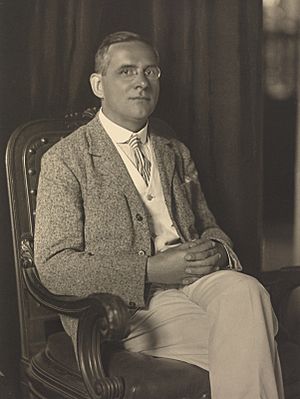Moritz Schlick facts for kids
Quick facts for kids
Moritz Schlick
|
|
|---|---|

Moritz Schlick around 1930
|
|
| Born |
Friedrich Albert Moritz Schlick
14 April 1882 |
| Died | 22 June 1936 (aged 54) Vienna, Austria
|
| Education | University of Heidelberg University of Lausanne University of Berlin (PhD, 1904) University of Rostock (Dr. phil. hab., 1910) |
| Era | 20th-century philosophy |
| Region | Western philosophy |
| School | Analytic philosophy Vienna Circle Logical positivism Foundationalism |
| Theses |
|
| Doctoral advisor | Max Planck |
| Doctoral students | Rudolf Carnap Karl Popper |
|
Main interests
|
Logic, philosophy of science, philosophy of mathematics, ethics |
|
Notable ideas
|
General theory of knowledge Beobachtungssatz (observational statement) Internal and application rules of grammar |
|
Influences
|
|
|
Influenced
|
|
Friedrich Albert Moritz Schlick (1882–1936) was an important German philosopher and physicist. He is known as the founder of logical positivism and the Vienna Circle. These were big ideas in philosophy during the 20th century.
Contents
Early Life and Studies
Moritz Schlick was born in Berlin, Germany, in 1882. His family was wealthy and had strong traditional views. When he was 16, he started reading famous philosophy books. He especially liked Thus Spoke Zarathustra by Nietzsche.
Schlick first studied physics at several universities, including the University of Berlin. He studied under Max Planck, a very famous physicist. Schlick chose physics because he wanted to find real and exact knowledge. He didn't trust ideas that were too abstract or unproven.
In 1904, he earned his PhD from the University of Berlin. His main project was about how light reflects in different materials. After this, he started studying philosophy more deeply. In 1908, he wrote a book called The Wisdom of Life. It was about finding happiness through personal growth, not just quick pleasures.
In 1910, he wrote another important paper about the nature of truth in modern logic. He also wrote about aesthetics (the study of beauty). Later, he focused on epistemology (how we know things) and the philosophy of science. In 1915, he wrote about Einstein's special theory of relativity, which was a very new idea at the time.
The Vienna Circle and New Ideas
In 1922, Schlick became a professor at the University of Vienna. He was very good at bringing smart people together. He started a group of scientists and philosophers who met regularly. They discussed big ideas in science and philosophy. This group became known as the Vienna Circle.
Important members included Rudolf Carnap, Herbert Feigl, and Kurt Gödel. They were interested in the ideas of Ludwig Wittgenstein, especially his book Tractatus Logico-Philosophicus. This book talked about how language works and how it relates to the world. Schlick and his group studied Wittgenstein's ideas carefully.
Schlick even encouraged Wittgenstein to return to philosophy after a long break. They had many discussions. These talks helped shape the ideas of the Vienna Circle.
Understanding Knowledge and Ethics
Schlick worked on his book General Theory of Knowledge for many years. In this book, he argued against the idea of "synthetic a priori knowledge." This is a complex idea, but simply put, he believed that the only truths we know just by thinking are like definitions (e.g., "all bachelors are unmarried"). All other truths, he said, must be checked using empirical evidence (things we can observe or test).
If a statement couldn't be proven or disproven by evidence, Schlick called it "metaphysical." For him, this meant it was "meaningless" or "nonsense." This idea was central to the Vienna Circle's thinking.
Between 1926 and 1930, Schlick wrote Problems of Ethics. Some of his colleagues were surprised because he included ethics as a proper part of philosophy. He believed that ethics could be studied in a meaningful way. He also defined positivism as any view that rejects "metaphysics." He thought that true knowledge comes from what we experience.
Schlick's Tragic Death
As the Nazis gained power in Germany and Austria, many members of the Vienna Circle left the country. However, Schlick chose to stay at the University of Vienna.
Sadly, on June 22, 1936, Moritz Schlick was murdered. A former student named Johann Nelböck shot him on the steps of the university. The killer was arrested and confessed. He claimed Schlick's philosophy had harmed his moral beliefs. Other reports suggested he was motivated by personal issues.
The murder became a big public event. Some people used it to spread nationalist and anti-Jewish ideas, even though Schlick was not Jewish. After Austria was taken over by Nazi Germany in 1938, the murderer was released from prison early.
Schlick's Lasting Impact
Moritz Schlick's most important contribution to philosophy was founding logical positivism. He was known for being kind, gentle, and encouraging to others. Many of his students and colleagues spoke highly of him.
Philosophers Herbert Feigl and Albert Blumberg wrote that Schlick had a unique ability to understand the most important parts of philosophical problems. Even though others might have made more exact arguments, Schlick had a special talent for seeing what truly mattered.
See also
 In Spanish: Moritz Schlick para niños
In Spanish: Moritz Schlick para niños
- Definitions of philosophy
 | Selma Burke |
 | Pauline Powell Burns |
 | Frederick J. Brown |
 | Robert Blackburn |


